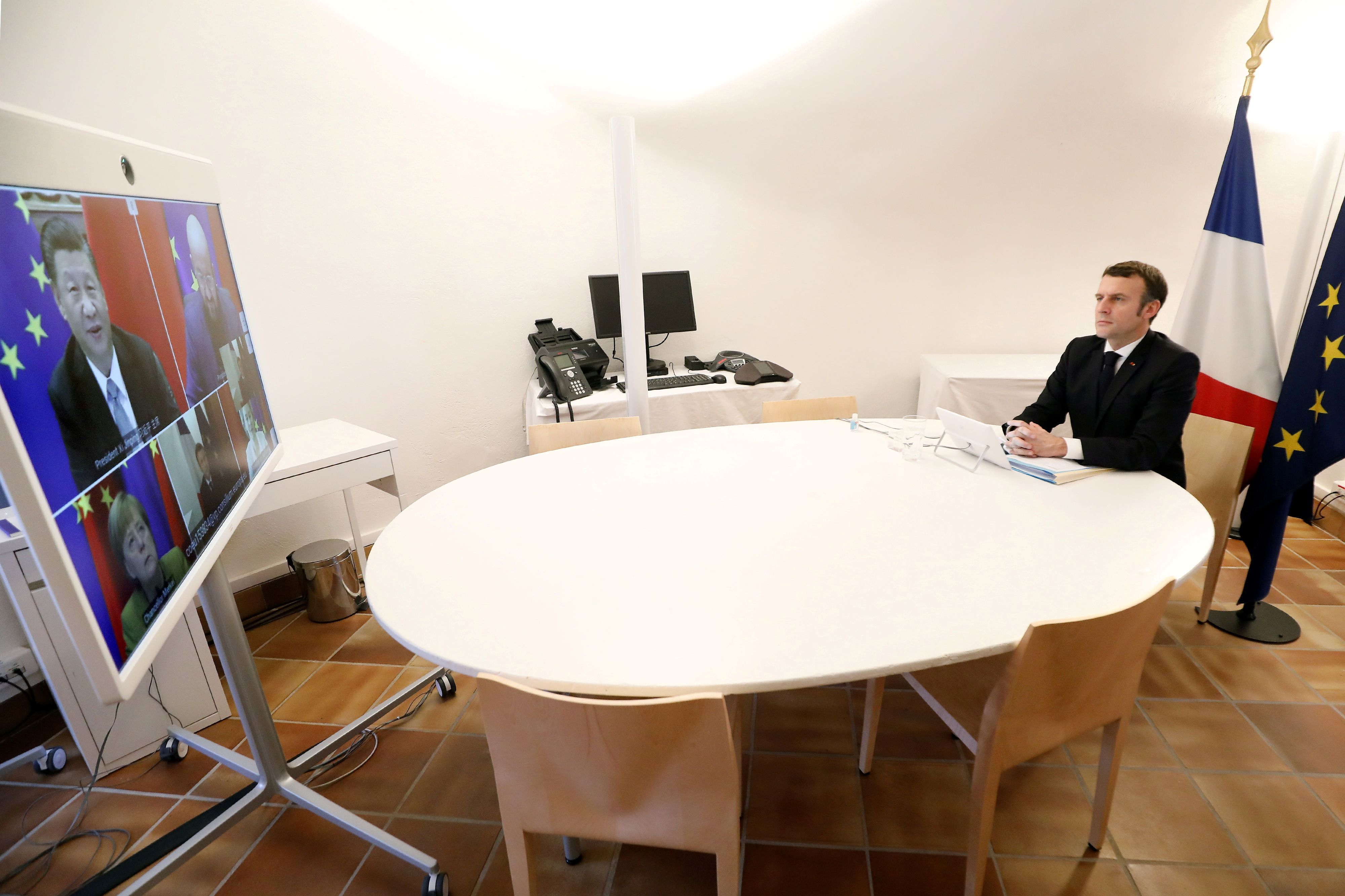Walking the Line: France’s Dilemma in Relations with China

For years, the French authorities have been trying to reconcile the desire to develop relations with China by defending their interests against the actions of this state. This has led to turbulence in Franco-Chinese relations in which moments of détente come between phases of disputes. The pandemic has exacerbated this imbalance and led to a deepening of France’s deficit in trade with China, which in 2020 amounted to about €40 billion (an increase of €6.6 billion). The need to import hygiene materials and pharmaceutical raw materials from China sparked a discussion about relocating strategically important production, even at the cost of reducing trade. France also has drawn attention to China’s lack of transparency concerning the outbreak of SARS-CoV-2.
Despite these doubts, the French authorities do not want to excessively restrict relations with China, as their priority is to engage the Chinese in reducing the debt of Africa and the fight against climate change. In December 2020, Macron also endorsed the CAI. However, instead of an improvement in Franco-Chinese relations, new misunderstandings arose in February and March 2021 that again call into question the French model of pragmatic relations with China.
France as a Balancing Power
The French ambitions in global politics are based on several pillars, such as France’s permanent seat on the UN Security Council, its armed forces, export potential, and role in the EU, which the country wants to make into a superpower through the strategic autonomy concept. Maintaining vigorous relations with China, both economically and politically, is an opportunity for France to increase and diversify its exports and emphasise its importance in global politics.
The plan for the development of Franco-Chinese relations, signed in November 2019 by Macron and Chinese leader Xi Jinping, was to be a signal of China’s will to balance their trade relations, accelerate the ecological transition (with the participation of French technologies), and comply with the standards of the World Trade Organisation. In 2020, China was ranked seventh (behind the U.S., the UK, and Germany, for example) among the top recipients of French exports. Companies from the aviation, pharmaceutical, automotive and, energy industries have won multi-billion euro contracts. The French authorities, despite pressure from the U.S., have also not decided to ban Huawei from involvement in the development of the French 5G network. In return, the Chinese company decided to build its first European factory in France.
The selective involvement of the EU and France in relations with China is intended to prevent the emergence of a Sino-Russian bloc directed against the EU and the U.S, essentially recreating the rivalry between West and East, with the democratic (U.S. and EU) powers on one side and authoritarian (China, Russia) powers on the other. This would be detrimental to the international positions of France and the EU, as the U.S. would naturally take the lead. Macron recently warned against a similar scenario, describing it as “the most conflicting possible”.
Macron’s concern was not alleviated by the arrival of a new U.S. president. On the one hand, the French authorities hope that the U.S. return to activity at the UN will allow democratic states to regain influence there. On the other hand, the French fear that the growing U.S.-Chinese tensions may reduce French export and investment opportunities in China. French politicians also believe that confrontational U.S. attitude towards China is caused mainly by the trade rivalry, an area in which the EU, as a competitor to the U.S., is not always in sync with the Americans.
Systemic Rivalry
France highlights its presence in the Indo-Pacific. The overseas departments and territories located in this area (including Mayotte, Réunion, New Caledonia, French Polynesia, Wallis and Futuna) are inhabited by 1.5 million people, while their maritime economic zone reaches 11 million km². The key issue, in addition to defending French territory, is ensuring freedom of navigation. Following its 2018 Indo-Pacific strategy, France is developing a partnership with China’s rivals Australia, India, Japan, and the U.S. (the Quad), conducting military exercises, and exporting weapons. It also sends warships to the South China Sea and the Taiwan Strait, triggering protests by the Chinese authorities (most recently in February 2021).
The Ministry of Foreign Affairs emphasises France’s interest in the situation in Xinjiang and the fate of the Uighurs. France is also trying to develop economic relations with Taiwan. In doing so, the French authorities are responding to the demands of the public and some in parliament. China, though, treats this as interference in its internal affairs. The reaction has included propaganda campaigns conducted both by state-dependent media in China and by Chinese diplomats in France. Criticism of the French strategy to combat COVID-19 from the Chinese embassy in France prompted the Chinese ambassador to be called to the French Ministry of Foreign Affairs in spring 2020. A second call to appear was renewed in March 2021 after Chinese diplomats insulted a French expert who had criticised China’s policy towards Taiwan.
While allowing Huawei to develop 5G technology in France, the authorities have significantly limited the scope of the Chinese company’s investments, fearing they could be pretexts for espionage. A new law forces the telecommunications companies Bouygues and SFR to remove several thousand Huawei antennas. The 5G technologies of the Chinese company are blocked in five large cities.
Macron’s consent to the CAI text after pressure from the German presidency of the EU Council also sparked controversy. In December 2020, it seemed that France might block the agreement, citing China’s reluctance to ratify ILO conventions. The French quickly withdrew their opposition after the Chinese side agreed to an unverifiable declaration of will to ratify the conventions. Macron publicly supported the CAI, appearing—outside of protocol—at a videoconference with Xi, alongside Chancellor Angela Merkel, representing the German presidency, and representatives of the European institutions.
The acceptance of the CAI caused dissatisfaction with the French opposition and part of the parliamentary majority. The left draws attention to the lack of credibility of Chinese climate protection commitments and violations of human rights by China. The right criticises Macron for making concessions to German export and investment interests. While the French authorities have declared their willingness to move some production from Asia back to France, the CAI may encourage further delocalisation and support Chinese exports to Europe.
Conclusions and Prospects
Macron wants the CAI to be ratified during the French presidency of the Council. This would prepare the ground for the further development of Franco-Chinese trade relations and would emphasise an equal role for France with Germany in shaping EU foreign policy. However, full acceptance of French MEPs, including Macron’s party, of the CAI is uncertain. Opposition to the agreement may unite voices reluctant to appease China, as well as Eurosceptics and supporters of protectionism.
China’s interference in the French public debate is intended to intimidate voices inconvenient to China and to test the patience of the French authorities. However, China’s aggressiveness seems to have worked against it: the criticism could force Macron to react strongly, even at the cost of jeopardising economic relations and France’s balancing act among the great powers.
The strategy pursued by the French authorities in the Indo-Pacific, and France’s military cooperation with India and Australia, make further tensions in relations with China inevitable. For France, its presence in the Indo-Pacific is also an instrument for building new relations with the U.S. In exchange for a strengthened partnership in this area, the French authorities will expect the Americans to respect the shaping of strategic autonomy by EU countries.
The common belief in France that it is necessary to selectively engage in relations with China and Russia in order to avoid an alliance of these countries in reality reinforces the diplomatic positions of both Russia and China and encourages them to further confrontational steps. French policymakers are analysing Sino-Russian relations mainly on the basis of a balance of powers and the complementarity of economies. They underestimate these states’ push to prioritise the stabilisation of political systems, which is typical of authoritarian systems. China and Russia take a confrontational course towards the EU and the U.S. because they feel their regimes are threatened by the principles of democratic states, such as freedom of speech, the division of power, or free elections.


